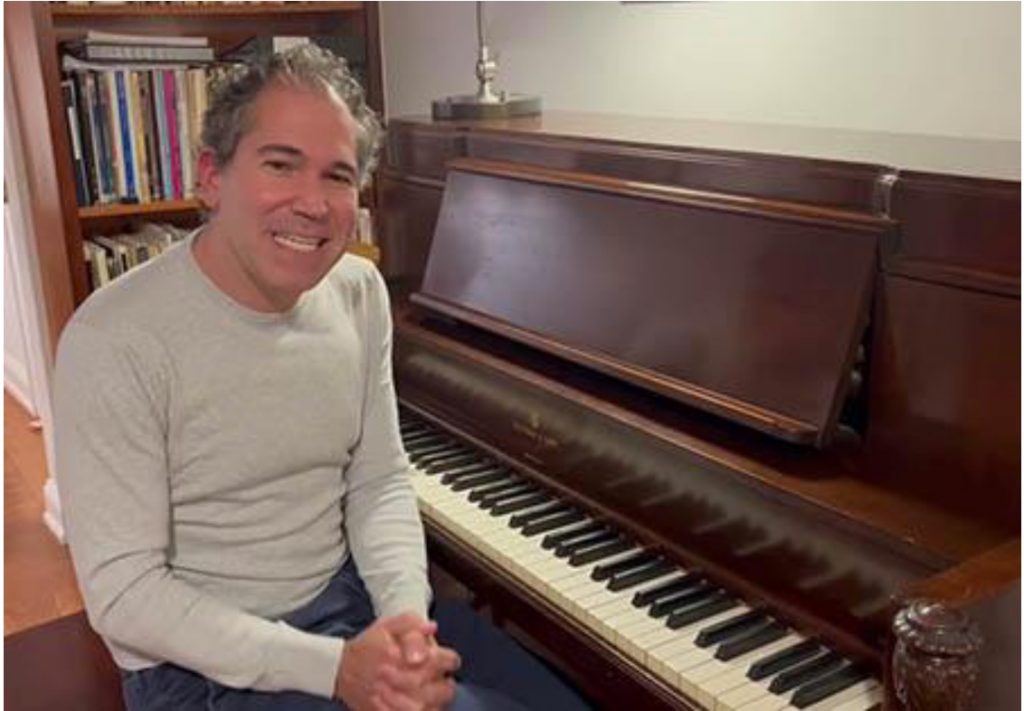by Mike Telin

On Sunday, August 13 at 7:00 pm at Blossom Music Center, Einhorn will lead Grammy and Tony Award–winning vocalist Audra McDonald and The Cleveland Orchestra in an evening of Broadway favorites. The program will include music by Rodgers and Hammerstein, Stephen Sondheim, George Gershwin, and others. Tickets are available online.
I reached Einhorn by phone in Aspen, Colorado.
Mike Telin: I understand you and Audra were out hiking.
Andy Einhorn: Yes, we’re trying to spend as much time in nature as possible.
MT: And you have a show this evening.
AE: We do. Last week we were in North Carolina and we’ll be at the Grand Teton Festival this coming weekend, and next week we’re in upstate New York at Saratoga Springs.
MT: We’re looking forward to the Blossom concert on the 13th — what can audiences expect to hear?
AE: The concert is a journey through what Audra and I consider the great Broadway songbook. There will be some Rodgers and Hammerstein, Lerner and Loewe, and the great John Kander. This is the repertoire that will live on forever and Audra is the consummate entertainer of our time in terms of the Broadway and American songbooks. And when you combine her with an ensemble like The Cleveland Orchestra, along with the energy that comes from a live performance — I’ve started calling our concerts a cathartic and healing experience for audiences — one minute you’re laughing and the next minute you’re crying because it was so beautiful.
Audra is a humanitarian first, and she believes in the power of good music. That comes through during the stories of these songs and having them be part of the journey really makes for something very special.
MT: You’ve been Audra’s music director since, what, 2011?
AE: Actually 2010, but we first worked together in 2006, so we’re verging on eighteen years together. And my last thirteen have been as her music director. It’s a beautiful relationship that both of us really enjoy — obviously, we love each other enough to go hiking.
It’s really a partnership that I think works for each of us. It’s a special relationship in my life because of the kind of artist that she is and how much I continue to learn from her, and I think that it goes both ways.
MT: It’s interesting that you say you learn from her — What do you learn from her?
AE: I think what makes Audra singular is not only that she’s an impeccable musician but also a fantastic person. When I’m around her I become a richer and deeper person. When we pick new repertoire, such as we’re doing right now, it’s a really interesting dance that we do with one another because I learn how she hears music and the kinds of things that are important to her as a musician. I also notice how much it informs my choices when I’m working with other artists, so it’s like having a little Audra on your shoulder whenever you want it.
MT: Everybody should have a little Audra on their shoulder.
AE: I’m prescribing it today.
MT: The other day I was telling a friend that I was going to speak to you and that you were Audra McDonald’s music director. He said, “that’s cool — what does a music director do?”
AE: That’s a great question. Part of my responsibility is shepherding the repertoire that we’re doing, and leading the concert. Sometimes it’s just me at the piano and sometimes — as we’re doing at Blossom — it’s with a full orchestra. In this case we’re given a two-and-a-half-hour rehearsal for the orchestra to learn the show for that night. That requires maximizing efficiency and being very clear during the rehearsal so that the performance goes off without a hitch.
The other part of the job is really taking care of Audra as the artist and as the performer. I started school as a voice major so my background is in singing. One of the real reasons we connected eighteen years ago was because I’m a singer at heart, so I conduct like a singer. I make it part of my job as her music director to make sure that she’s singing healthily and taking care of her instrument. I sort of like to think of myself as a mother bear protecting the artist.
MT: That’s a lot of responsibility.
AE: Audra still studies with a regular voice teacher and I’m her coach, so it’s no different from being a prime athlete and having a coach.
MT: You started at Rice as a voice major?
AE: I did. But in my second semester of freshman year I switched to piano because I had always been a pianist, and the one thing I really wanted to do was to conduct. But Rice did not have an undergraduate conducting degree, so the best option for me was to study more piano and spend time working on theory and understanding music on a broader level. I took all of the diction classes for languages because the thing that I love the most is collaborating with singers.
I also hear music in the sense of melody and all of the emotions that go along with that. Rodgers and Hammerstein, Harold Arlen, Jerry Herman, Jule Styne, Frank Loesser — these were composers who really understood that popular music of the day was popular because it was relatable to people and it allowed them to feel connected to it. Oftentimes it was because they were brilliant lyricists who understood the language at a level that I wish young musical theater composers would study more to really understand how to create long-lasting works of art.
Published on ClevelandClassical.com August 9, 2023.
Click here for a printable copy of this article


